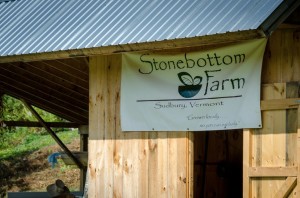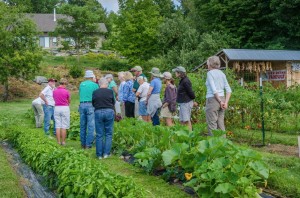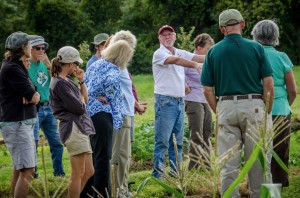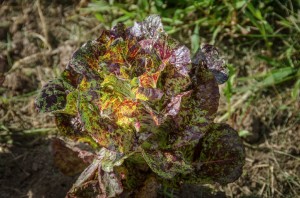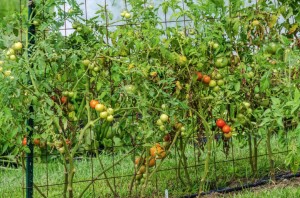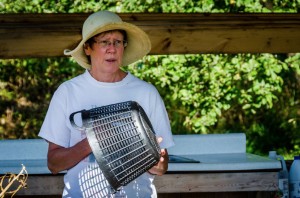Visiting Stonebottom Farm
Small vegetable farms, often the work of just two or three people, dot the rural Vermont landscape. And week after week, for months on end, these farmers set out their beautiful produce at farm stands, farmer’s markets and food cooperatives across the state for us lucky consumers to buy.
I am always in awe of these farmers’ ability to grow so many varieties of all kinds of vegetables on their small farms, and to keep them constantly coming. My own vegetable garden certainly produces, but often in fits and starts. For instance, this is a great year for kale but not so good for tomatoes. And, as for peppers, I have just about given up trying to grow them up here in the mountains.
So it was a real treat to be able to spend a couple of hours at Stonebottom Farm in Sudbury with David Cobb and his wife Karen Sommerlad, and learn about their farming lives.
It was mid-August and a perfect Vermont summer afternoon. Overhead fluffy white clouds floated across a clear blue sky. A light breeze kept us cool. And the biting bugs were non-existent!
Twenty eager Vermont Master Gardeners gathered in the field to listen to David, also a Vermont Master Gardener, and Karen described some of the ins and outs their small organic vegetable farm. And, since this was an official Master Gardener event, we had actually picked this date about ten months earlier, so we could not be more fortunate to have such lovely weather PLUS a lack of bugs.
It is hard to believe that David and Karen only recently moved to Vermont, leaving behind typically busy lives in Massachusetts, he as the curator of maps at Harvard University, and she as an urban planner. After building their timber house up on the knoll, they set about converting part the flat pasture below into the vegetable farm we see today.
David and Karen do everything themselves, typically working the land together for about four hours a day. As David pointed out, ‘we are the help’ and their main goal is to offer their customers produce that is both ‘fresh and quality‘, which they control by deliberately staying small.
So, for the past four years David and Karen have been selling their produce at the Brandon Farmer’s Market, and more recently to a local restaurant and for the lunch program at the nearby Sudbury and Whiting schools.
They farm about an acre of land, using rows that are 3′ wide and 120’ long. They devote a single row, or sometimes just a part of a row, to a particular crop.
Good seeds to start the season
David and Karen start almost all their crops from seed, buying from companies that supply organic seeds, especially High Mowing in Vermont, as well as Fedco and Johnny’s Seeds in Maine. (As David noted, Fedco offers free shipping on orders over $30).
They start most seeds in trays indoors where they use the warmth of an electric blanket to spur germination. After germination they move the seed trays to a small 8’x10′ unheated greenhouse the seedlings can be cossetted until they are ready for the rigors of the field.
However they do purchase onions as sets (tiny onions ready to grow on to full size) from Dixondale Farm in Texas, as well as seed potatoes for their gourmet fingerling potatoes from Maine.
Choosing crops with customer appeal
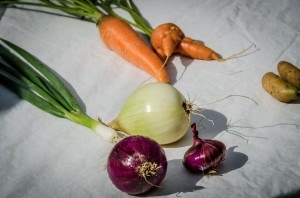
David shows us a sample of some of his best selling crops including: ‘Red Wing’ and yellow onions; Nantes half-long carrots; and Fingerling potatoes
The old adage of ‘Know thy Customer‘ applies for food as much as anything else. Eye appeal is important too.
So the current crop mix at Stonebottom Farm reflects the tastes of the Brandon market as well as specialty items, like the purple colored beans that both school lunch managers hope will intrigue the kids and encourage them to get excited about their veggies.
They also grow a crop of super hot Thai peppers along with some Thai basil especially for a woman in Rutland who cooks up delicious Thai food for the Rutland Farmers Market.
So: what sells?
Here is a partial list of crops with that appeal to the customers of Stonebottom farm:
Peas: Oregon Giant
Lettuce, especially varieties that don’t bolt such as this speckled variety.
Tomatoes: of course!
Three varieties of Kale: Lactino Red Russian and Winterbor
Beets: including ‘Bulls Blood’ for its red leaves
Leeks: King Richard
Carrots: many varieties
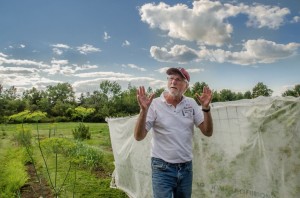
Growing parthenocarpic cucumbers encased in row fabric to avoid cross-pollination and minimize predatory bugs.
Beans: kids like the purple ones
Onions: ‘Red wings’ for ‘eye appeal’ plus common yellow
Cucumber: including the seedless ‘parthenocarpic‘ varieties grown up inside an ingenious row-covered trellis
Okra
Potatoes: Fingerlings and Yukon Gold
Several varieties of winter squash
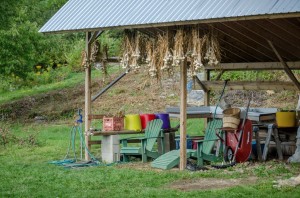
Garlic hung up to dry. Most will be sold, but the largest heads will be saved replanted to create next year’s crop
Lots of hard-neck garlic which we could see already drying in the barn.
Triple washed
Everything is triple washed before it goes it to market. An ingenious and inexpensive system of using an over-sized colander to swish the produce through successive trug buckets of water has proven very effective.
Good garden practices make all the difference
A wealth of good garden practices go into making a successful farm operation. And these are surely applicable on a smaller scale of our home veggie gardens. Here are some of David and Karen’s recommendations which apply to all of us:
Nurture the soil
Soil testing is critical, especially at the outset when you are beginning with an unknown soil. But even with a seasoned garden, getting the soil tested regularly will help decide if you need to consider any amendments.
Continue to add compost to promote the health of your soil. David and Karen apply a $400 load of Moo-doo, composted cow manure from Vermont Natural Ag, to their soil annually. If you have access to a small pick-up truck you can easily pick up a cubic yard or so for your own garden at their Middlebury farm, located at the south end of town on Lower Foote Street.
Fertilizers also help boost the yield. Among the various types of organic fertilizers available David and Karen favor fish emulsion, which they buy through the bulk ordering service provided each spring by the Northeast Organic Farming Association of Vermont, or NOFA Vermont. As David pointed out, their bulk ordering service alone is a good reason for every serious gardener to join NOFA.
Pest and disease management
Several techniques will help with the continuing battle that all gardeners face
Use row covers to help deter destructive pests.
Be diligent in watching for, and destroying, things like the squash beetle.
Only if really necessary resort to using a spray. Then be sure to choose one that is approved for organic gardeners.
Rotate religiously
David and Karen keep precise notes of what they planted in each spot every year. The following year they will then grow that crop as well as its relatives, in a totally different section of the garden. Remember, tomatoes, peppers and potatoes are all part of the same family and, from a rotation point of view, need to be considered as a single crop type.
Succession planting
I am one of those who has a big planting day each spring, after which, as I fuss over to my flower gardens, the veggie garden has to more or less end for itself. However it is amazing how much more productive I could make my own garden if I were disciplined enough to start small rows of new plantings throughout the season, thus making better use of both the season and the land.
When we visited Stonebottom in mid August, David and Karen had just set out new plantings of lettuce, carrots, beans and radishes, and now their harvest season will be continuing well into November.
Water and mulch
This year David and Karen installed new drip irrigation system, which in turn allow them to use black plastic as a mulch to counter the weeds.
And, last but not least, diversify your crops
Every year if different. And, by growing a mix of veggies you will be sure to have some winners every year.
David declared 2013, with all the spring rains we experienced, as THE BEST BEET SEASON EVER.
As he said, ‘Beets love water. They will grow beautifully in MUD’!
